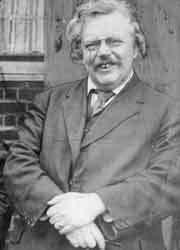Metaphysical Realism and Chesterton's Manalive

Chesterton's Metaphysical Realism
Chesterton held to a high epistemological fit between our common sense reason and the universe. We begin with the world's is-ness and treat our objective relationship to it as a given, though an, unfortunately, threatened one. This view had a number of consequences in his thought:
- The creation is good, to be honored, and celebrated. By nature of its goodness, its epistemic verity can be relied upon unless something ruptures our relationship to its truthfulness.
- An assumption of a singularly material universe is ultimately fatalistic and pessimistic; likewise, a solipsistic subjectivity is ultimately a trap for egotism and madness.
- The world is best interpreted as free in tandem with God's freedom. Our own free will is another given with which we begin. The opposites of the universe are themselves productive of the category of freedom and would have existed in some sense even without its current fallen state.
- Life is meant to be lived in a wholeness that integrates mind and body, society and spirit. Loyalty to the cosmos requires loving it holistically.
- The universe is organized around a series of parallel analogies, and it possesses numerous mysteries by virtue of being God-created. This quality of mystery is one that we should accept for it as often results in awe and joy as in fear and being overwhelmed. Humility is an epistemic necessity.
- Wonder and gratitude are important virtues, for we must struggle to maintain our sense of "romantic" reality. Human happiness is in constant peril.
- The paradoxical nature of Christianity fits the paradoxical nature of the universe. Not only the doctrine of creation, but the doctrines of the Incarnation and the Crucifixion are essential to valuing the physical, embodied social world as it truly is.
Exploratory Questions
- Does one's attitude to the universe really matter in getting it right?
- Are Chesterton's stresses on freedom, mystery, paradox, and goodness a coherent system? Could one have one or more without the others? What would the result be?
- Are wonder and gratitude necessary to human happiness? Are they really things we must vigilantly maintain? Why or why not?
Discussion Questions
- How much is Innocent Smith emblematic of Chesterton's metaphysical realism?
- Is his approach to life (even if exaggerated in the novel) an actual possibility for human life?
- Smith has been called "a holy fool." What does such a label imply? Is it a fitting description?
+ + +
"I do not deny that it is sometimes a good thing to empty the mind of the mere accumulation of secondary and tertiary impressions. If what is meant is something which a friend of mine once called "a mental spring clean," then I can see what it means. But the most drastic spring clean in a house does not generally wash away the house. It does not tear down the roof like a cobweb, or pluck up the walls like weeds. And the true formula is not so much to empty the mind as to discover that we cannot empty the mind, by emptying it as much as we can. In other words we always came back to certain fundamentals which are convictions, because we can hardly even conceive their contraries. But it is the paradox of human language that though these truths are in a manner past all parallel, hard and clear, yet any attempt to talk about them always has the appearance of being hazy and elusive."--Fancies and Fads (1923)
"There is at the back of all our lives an abyss of light, more blinding and unfathomable than any abyss of darkness; and it is the abyss of actuality, of existence, of the fact that things truly are, and that we ourselves are incredibly and sometimes almost incredulously real. It is the fundamental fact of being, as against not being; it is unthinkable, yet we cannot unthink it, though we may sometimes be unthinking about it; unthinking and especially unthanking. For he who has realized this reality knows that it does outweigh, literally to infinity, all lesser regrets or arguments for negation, and that under all our “rumblings there is a subconscious substance of gratitude. That light of the positive is the business of the poets, because they see all things in the light of it more than do other men.. . . Creation was the greatest of all Revolutions. It was for that, as the ancient poet said, that the morning stars sang together; and the most modern poets, like the medieval poets, may descend very far from that height of realization and stray and stumble and seem distraught; but we shall know them for the Sons of God, when they are still shouting for joy. This is something much more mystical and absolute than any modern thing that is called optimism; for it is only rarely that we realize, like a vision of the heavens filled with a chorus of giants, the primeval duty of Praise."--Chaucer (1932)
